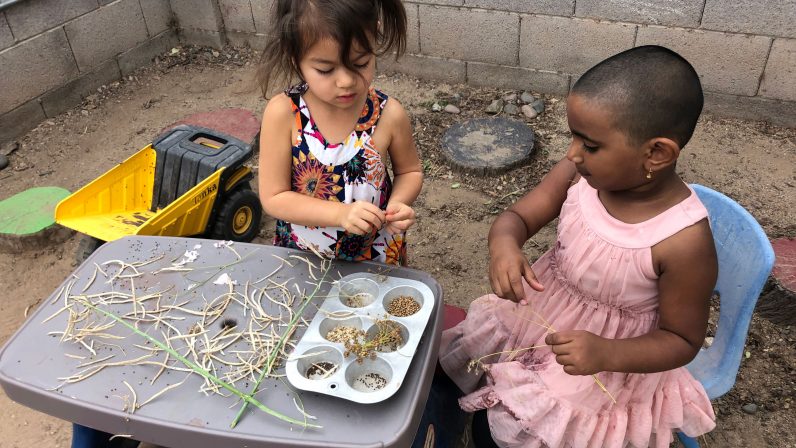Harvesting seeds is no easy task, especially for three-year-old fingers. In case you’re unfamiliar with kale, broccoli, cauliflower, and cilantro seeds, they’re about the size of a small pin head. They mostly grow in long thin pods that only crack open easily when they are dry. There’s a purpose behind the tediousness of harvesting tiny seeds.
For the past several years, we’ve been appreciative recipients of a seed grant from Native Seeds/SEARCH. Schools can apply for a grant by submitting information about their gardening program. Part of the commitment is documentation of the process, including harvesting and distributing seeds. Admittedly, we’ve sometimes fallen short on the last phase. This year, hoping to do better, I spoke with our Early 3s teacher, who was one of our most prolific gardeners this year. She agreed to set the harvesting in motion and packaged seeds for families to take home. Families can choose which seeds they’d like to try planting at home.
Growing a garden and saving seeds for the next generation of plants has many benefits. There’s the fine motor practice of cracking open pods and picking out the tiny seeds. Sorting and classifying is always a good skill to practice, especially early on in life. Packaging seeds for sharing adds a layer of generosity to the process. Witnessing the way in which seeds sprout in soil and become plants is nothing short of miraculous.
One of our main intentions for having gardens at the Seed is to give children exposure to the entire growing cycle when they are young. We’ve found they have a deeper appreciation for their food when they understand how long it takes to grow a carrot, for example. Knowing what it takes to grow that carrot invites them to think about eating the whole carrot instead of taking a bite and throwing it away. Growing vegetables also encourages hesitant eaters to try new foods. Children reluctant to eating anything green will often chomp eagerly on a pea pod when picked right from the garden.
Saving seeds in our school gardens gives children the message that they have an integral role to play in supporting our food chain. Establishing a practice of appreciation for our food and how it grows can set up healthier eating habits as children move into adolescence and adulthood.
While Early 3s students were saving their seeds, our 3rd and 4th graders began learning about another important food topic, global food waste. It’s a problem that won’t be solved overnight, and one that will have a huge impact on future of citizens of Planet Earth. It’s a different type of seed planting we do here at the Seed, one that will hopefully bear fruit in years to come. Empowering children with this kind of information shapes their decisions and lifestyle choices as they move on from Awakening Seed. I have no doubt that this crop will vocalize their ideas as they continue their own sprouting and blooming processes.
Click here for more about global food waste.

